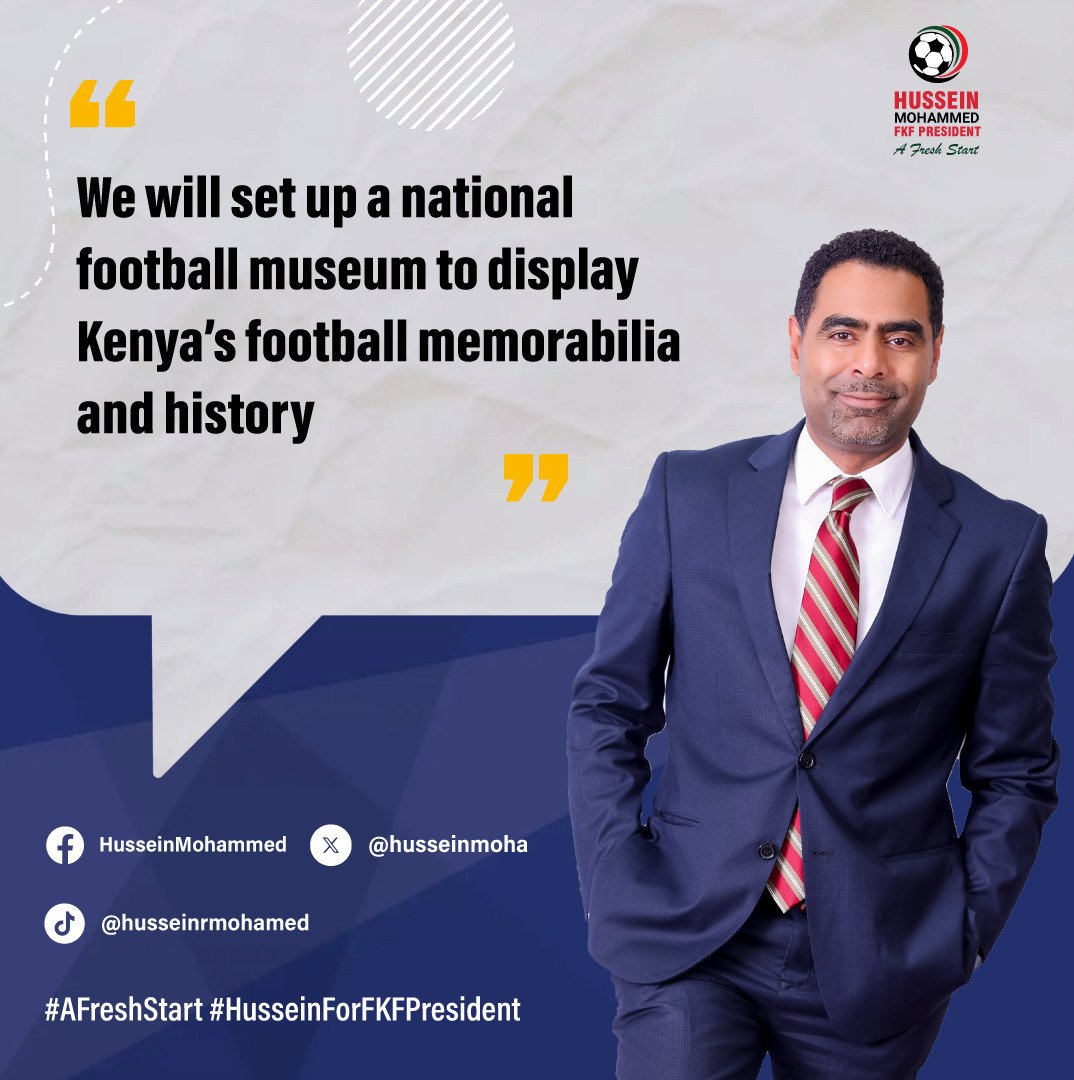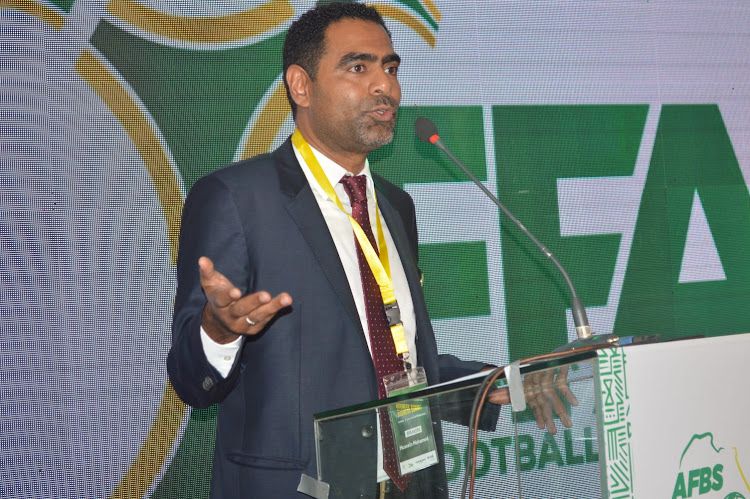Hussein Mohammed has entered the race for the Football Kenya Federation (FKF) presidency with an ambitious plan to revolutionize Kenyan football. His campaign, titled ‘Fresh Start,’ is focused on restructuring the management of football in Kenya, providing autonomy to the national leagues, and significantly boosting support for clubs, infrastructure, and the development of women’s football. Mohammed’s vision includes involving former footballers in the sport’s administration and ensuring that the rules and regulations governing the FKF are respected. This article delves into the key elements of Mohammed’s campaign and what it could mean for the future of Kenyan football.
Overhauling the Management of National Leagues
One of the cornerstone promises of Hussein Mohammed’s campaign is the complete restructuring of how national leagues are managed. Mohammed has emphasized the importance of granting autonomy to the Football Kenya Federation Premier League (FKFPL) clubs. This autonomy, he argues, is essential for attracting sponsorships and allowing clubs to thrive independently.
“My administration will restructure how national leagues are run and governed, ensuring their autonomy to attract sponsorships. There’s no reason why our champions can’t earn as much as Sh.50 million,” Mohammed stated. This pledge to increase prize money to Sh.50 million reflects his commitment to providing financial incentives that will drive competitiveness and enhance the overall quality of football in Kenya.
By allowing branches to negotiate their own sponsorship deals, Mohammed believes that clubs will have greater control over their financial destinies, leading to a more robust and self-sustaining football ecosystem. This approach is expected to not only benefit the clubs but also increase the attractiveness of the leagues to both local and international sponsors.
Infrastructure Development: Building Mid-Sized Stadiums
 Another significant aspect of Hussein Mohammed’s plan is the development of football infrastructure across Kenya. Recognizing the importance of quality facilities in nurturing talent and hosting competitive matches, Mohammed has proposed a partnership with national and county governments to build mid-sized stadiums.
Another significant aspect of Hussein Mohammed’s plan is the development of football infrastructure across Kenya. Recognizing the importance of quality facilities in nurturing talent and hosting competitive matches, Mohammed has proposed a partnership with national and county governments to build mid-sized stadiums.
“We will partner with national and county governments to establish 5,000 to 10,000-seater stadiums,” Mohammed announced. These stadiums are intended to provide a conducive environment for both training and competitive matches, particularly in regions where football infrastructure is lacking. By improving access to quality facilities, Mohammed aims to elevate the standard of football in Kenya and provide a platform for local talent to flourish.
These developments are expected to benefit not only the clubs but also the communities around them, fostering a deeper connection between football and local development. The improved infrastructure will also make it easier to host international matches, attracting global attention and investment to Kenyan football.
Prioritizing Women’s Football
Women’s football is another area where Hussein Mohammed plans to make significant strides. Acknowledging the potential of women’s football in Kenya, he has pledged to prioritize the development of the women’s game at all levels. This includes empowering young girls to take up football and providing them with the resources and opportunities needed to succeed.
 Mohammed pointed to the recent success of the national under-17 women’s team, which qualified for the World Cup in the Dominican Republic, as evidence of the untapped potential in women’s football in Kenya. “The national under-17 team’s qualification for the World Cup in the Dominican Republic is a testament to the potential that exists here,” he noted. By focusing on the development of women’s football, Mohammed aims to ensure that this potential is fully realized.
Mohammed pointed to the recent success of the national under-17 women’s team, which qualified for the World Cup in the Dominican Republic, as evidence of the untapped potential in women’s football in Kenya. “The national under-17 team’s qualification for the World Cup in the Dominican Republic is a testament to the potential that exists here,” he noted. By focusing on the development of women’s football, Mohammed aims to ensure that this potential is fully realized.
This commitment to women’s football includes not only support for players but also for the development of coaches, referees, and administrators within the women’s game. By creating a more inclusive environment, Mohammed hopes to inspire a new generation of female footballers and contribute to the growth of the sport nationwide.
Involving Former Footballers in Administration
 Hussein Mohammed’s vision for Kenyan football also includes a significant role for former footballers. He believes that the experience and insights of these players are invaluable for the effective management and growth of the sport. Under his administration, former footballers will be encouraged to take up roles beyond coaching, including positions in administration and governance.
Hussein Mohammed’s vision for Kenyan football also includes a significant role for former footballers. He believes that the experience and insights of these players are invaluable for the effective management and growth of the sport. Under his administration, former footballers will be encouraged to take up roles beyond coaching, including positions in administration and governance.
“Former internationals require capacity building beyond just coaching. They should be encouraged to take up other roles as well. We will establish a hall of fame for them and also a retirement scheme with adequate health coverage,” Mohammed promised. This initiative is designed to ensure that former players remain involved in football and contribute to its development long after their playing careers have ended.
The proposed hall of fame and retirement scheme are part of Mohammed’s broader plan to recognize and honor the contributions of Kenya’s football legends. By providing them with opportunities for career development and ensuring their well-being, Mohammed aims to create a supportive environment where former players can continue to impact the sport positively.
Ensuring Fair Elections and Respect for the Sports Act
In addition to his plans for football development, Hussein Mohammed has also addressed the need for fair and transparent elections within the FKF. He has called for the electoral code to be strictly adhered to, ensuring a level playing field for all candidates. Mohammed has also criticized the current FKF President, Nick Mwendwa, urging him to respect the Sports Act and not seek re-election after serving the mandatory two terms.
“It’s crucial that the Sports Act is respected, and that no candidate attempts to circumvent the rules. This election must be fair and transparent to ensure the best outcome for Kenyan football,” Mohammed asserted. His commitment to fair governance is central to his campaign, as he seeks to restore integrity and trust within the FKF.
Mohammed’s stance on the elections has garnered support from various stakeholders in Kenyan football, including former international Boniface Ambani. Ambani has expressed confidence in Mohammed’s ability to bring about the necessary changes to revitalize the sport, saying, “Hussein has what it takes to turn around the ailing sport.”
Conclusion
Hussein Mohammed’s bid for the FKF presidency is marked by a comprehensive and ambitious plan to transform Kenyan football. From restructuring the management of national leagues to prioritizing women’s football and involving former players in administration, Mohammed’s ‘Fresh Start’ campaign offers a vision of a more dynamic and successful future for the sport in Kenya. With a focus on fair governance, infrastructure development, and financial support for clubs, Mohammed aims to create a football ecosystem that is both self-sustaining and globally competitive. As the FKF elections approach, stakeholders in Kenyan football will be closely watching to see if Mohammed’s vision can become a reality.


